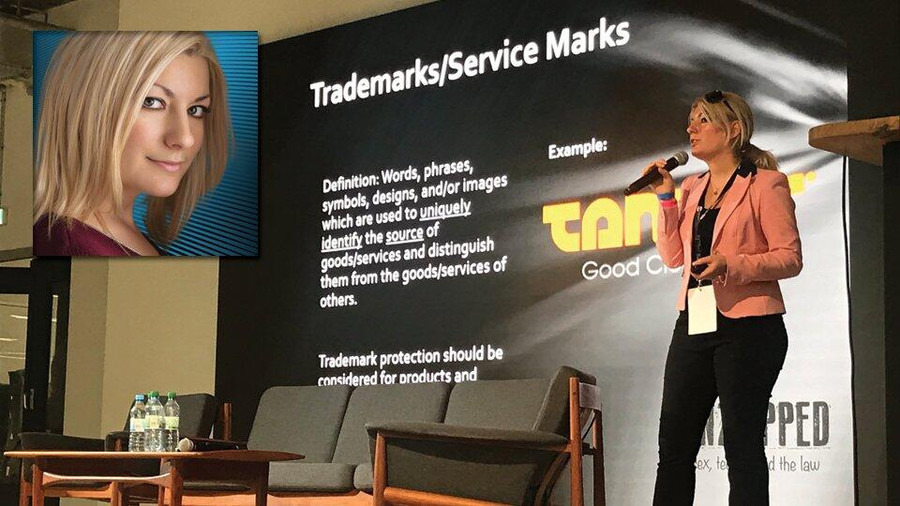It was a pleasure (pun intended) to participate in the “Sx Tech” conference in Berlin on July 1. The first-of-its-kind event was dedicated exclusively to fem-technology and sex technology. The agenda was impressive, with panels, masterclasses and a hack-a-thon.
The day kicked off in the main exhibition hall with Dominnique Karetsos of Healthy Pleasure Collective interviewing conference CEO Ola Miedzynska. Miedzynska explained that a major driver in her founding of the conference is the sex tech industry’s lack of access to incubators, accelerators and investors due to taboos surrounding sex. The audience looked on with excitement throughout a day that promised to help sex tech take its next steps forward for a more positive future.
The panels and presentations touched on a wide array of topics including tech, entertainment, innovation, marketing, legal, ethics and investments.
Calandra Balfour of LoveGivR served as stage host. Throughout the day, that stage was graced with some of the best-known names in sex tech. A few notable examples include Ida Tin of Clue, Madeleine Shaw of Lunapads, Virginia Cerrone of Pure Eros and even a guest appearance by artificially intelligent [sex doll] head, Harmony, of Realbotix.
The panels and presentations touched on a wide array of topics including tech, entertainment, innovation, marketing, legal, ethics and investments. A panel titled “Are We Ready for Robots” covered socio-cultural norms, pleasure and therapeutic potentials of VR, AR, AI and robotics. Another panel, “Dawn of Intelligent Contraception,” focused on the future of contraceptive efficiency and pregnancy planning with less invasive methods.
WOW Tech Group, the headlining sponsor, was set up opposite the main stage behind the audience with their products in pretty displays and reps there to explain what they do. The reps worked the floor all day with people shuffling in and out of the hall between sessions.
Master classes were held in a room separate from the main hall. The room was small and cozy to allow attendees to interact with one another as well as the speaker. Here, attendees were able to dive deeper into topics to enhance their understanding. Some of the seminars included “Sex Content: How to Avoid Biased Writing” with Dr. Maria Fernanda Peraza Godoy of Healthy Pleasure Collective, and “Funding: A Discussion on Sex Tech Portfolios” with Lisa Wenner of Firstminute Capital.
I presented three times at the conference. First, I was on a panel with Emma Sayle of Killing Kittens, moderated by Calandra Balfour, in which we talked about building sex tech communities both online and off. Later in the day, I presented a master class to attentive listeners about intellectual property protection in the U.S., E.U. and around the word. My portion finished late in the afternoon with a keynote on the current legal landscape surrounding sex tech. The topics included FOSTA, UK age verification, morality clauses in patent and trademark law, GDPR and much more.
Networking abounded among the large and diverse group of attendees. I was excited to get the chance to meet so many people that I had known in the “Twitter-verse” or from LinkedIn, but had not yet gotten to meet IRL. I met established players and budding entrepreneurs with ideas for new apps, sex education resources and hardware technologies.
During the conference, participants in the hack-a-thon were hunkered down in various rooms thinking, creating and planning. Thirty hackers were split into several teams. The winning idea was an app for sex workers that included a background check, a two-sided rating system and peer-to-peer payment system to make sex work safer.
Of course, no conference is complete without an after-party! The post-show soirée was awesome. It gave a great opportunity to get to know people on a more personal level. The main bar was on the ground floor, while a live performer entertained on the upper floor with her beautiful singing voice. On the lower floor, Terpon was giving demos of their VR porn platform to many people enthusiastic to try it. Everyone sipped on a drink, here and there stepping out onto the patio to enjoy the breezy Berlin night air.
Overall, Sx Tech was a huge success. It brought together thought leaders and innovators from all over Europe and the world to learn, teach and share knowledge in an industry where information is typically shrouded in mystery. Bravo to Miedzynska and her team — I look forward to attending again in 2020!
Maxine Lynn is an intellectual property attorney for the sextech and adult industry. Through her company, Unzipped Media, Inc., she publishes a blog titled “Unzipped: Sex, Tech and the Law” and a podcast titled “Unzipped: The Business of Sex.” She also compiles the Sex Tech Patent IndeXXX bulletin, which provides statistics and trend analyses relating to patents covering sex toys and pleasure technologies.






